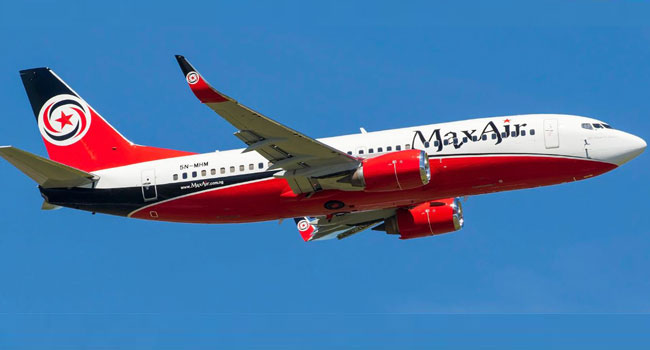NCAA grounds Max Air’s B737 plane, probes adulterated fuel
The Nigeria Civil Aviation Authority (NCAA) yesterday suspended with immediate effect the operation of the Boeing 737 Aircraft in the fleet of Max Air Limited. The suspension of the B737 aircraft used for domestic flights in the fleet of the airline has shut down the airline’s domestic operations temporarily even as the authority has commenced […]

The Nigeria Civil Aviation Authority (NCAA) yesterday suspended with immediate effect the operation of the Boeing 737 Aircraft in the fleet of Max Air Limited.
The suspension of the B737 aircraft used for domestic flights in the fleet of the airline has shut down the airline’s domestic operations temporarily even as the authority has commenced an immediate audit of the airline.
However, fresh facts emerged yesterday over how the airline discovered a substantial volume of water in the airline’s B737 aircraft fuel tank which could have caused a mishap.
The aircraft was on Tuesday scheduled to operate Maiduguri but the crew diverted to Yola after noticing a snag.
NEWS EXTRA: Ekiti bans ‘Kiss-a-Thon’ event
NEWS EXTRA: Herbalist Testifies Against Abiodun At Tribunal
It was there that hundreds of litres of water were discovered in the fuel tank and the flight was aborted.
Aviation authorities are already looking into the fuel contamination with the NCAA dispatching a team of inspectors to Lagos, Abuja and Kano to audit the fuel suppliers.
A highly placed source said, “NCAA has sent a team of inspectors to Lagos, Abuja and Kano to audit all the fuelers because the quantum of water is not what can easily find its way into the tank.
“Even if you are not doing a water check for three years, that water should not find its way into the tank.”
It was learnt that the quantum of water in the tank affected other components of the aircraft which is now grounded and undergoing further checks.
NCAA, while announcing the suspension of the airline’s B737 aircraft said, “The authority’s action is based on several occurrences that involved the Boeing B737 aircraft type listed below.
The occurrences listed in the letter include the Loss of Number 1 Main Landing Gear (MLG) wheel during the serious incident involving a Boeing 737-400 aircraft, registration marks 5N-MBD which occurred between take-off at Yola Airport Adamawa State and on landing at Nnamdi Azikiwe International Airport, Abuja Nigeria on 7th May 2023.
Another incident was fuel contamination of the main fuel tanks of aircraft B737-300, Registration Marks; 5N-MHM, leading to the Auxiliary Power Unit (APU) shutdown on the ground at Yola Airport on the 7th of July, 2023.
The third incident was the aborted take-off of Boeing 737-400 aircraft, registration marks 5N-MBD, which occurred at the Mallam Aminu Kano International Airport (MAKIA) due to high Exhaust Gas Temperature (EGT) indication on the 11th of July, 2023.
Lastly, an air return by aircraft B737-300, Registration Marks; 5N-MHM to Nnamdi Azikiwe International Airport (NAIA) due to duct overheat indication in the cockpit on the 11th of July, 2023.
The General Manager, Public Relations of NCAA, Mr Sam Adurogboye, disclosed that the authority had constituted a team of inspectors to conduct an audit of the organization.
“The result of the audit on Max Air Limited must be satisfactory before the airline would be allowed to further operate the aircraft type.
“The Nigeria Civil Aviation Authority (NCAA) will continue to provide a robust oversight role for the industry and violations of safety regulations would be viewed seriously,” the NCAA said.
Speaking with our correspondent, the Executive Director of Max Air, Shehu Wada, who also confirmed the fuel adulteration, said the issue was being resolved.
He explained that the airline discovered that adulterated fuel was sold to it and in line with its commitment to safety decided to carry out an in-house audit and suspend operation for two days before the NCAA waded in.
He said the issues, which border on safety, would be resolved in less than a week, adding the airline remained committed to safe operations at all times.
“The fact is that there was the issue of adulterated fuel which we also noted. It was noticed by our maintenance. We now decided to give ourselves a two-day break to be able to do an in-house audit,” he said.
On the domestic operations, he said, “We will try and see what we can do in the interim. It is not something major and we will resolve it within a week. It is a safety issue and we have to follow the process. It only shows that everybody is conscious of its responsibility.”
